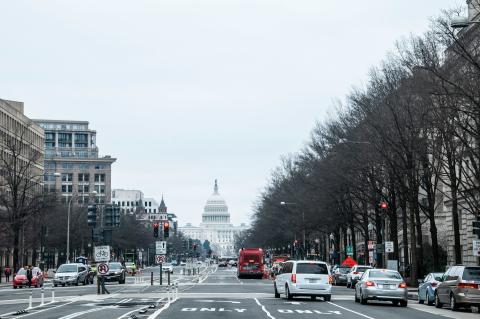Photo by Maria Oswalt on Unsplash
A DC campaign has collected more than 40,000 signatures to put an initiative on the city’s ballot that would open primary elections to independent voters and implement ranked choice voting in all District elections.
The Yes on 83 campaign, formally known as Make All Votes Count DC, announced that it will submit its signatures to the DC Board of Elections on July 1.
“Such broad support of Initiative 83 across the District is not just empowering, but a clear sign that D.C. voters are hungry for more equitable and inclusive elections,” said Lisa D. T. Rice, who proposed Initiative 83 and is the Ward 7 ANC Commissioner.
Yes on 83 far exceeded the 22,500 signatures needed for the initiative to qualify for the ballot. The campaign needed participation from 5% of registered voters in each of DC’s 8 wards, which it more than covered with the total signatures gathered.
“These numbers reflect a recurring theme that our dedicated grassroots team has been hearing over the past six months: that the status quo is anything but democratic. Initiative 83 will change that,” Rice added.
Initiative 83 is also known as “The Ranked Choice Voting and Open The Primary Elections to Independent Voters Act of 2024.”
The initiative would replace the city’s current closed primary election system with a semi-open system in which registered party members would be required to vote in their own party’s primary, but independent voters would be able to select a party’s ballot.
This would enfranchise 71,000 voters registered independent of any political party but are excluded from elections paid for with their tax dollars and are the most critical stage of the elections process.
“DC is a one-party town, but a lot of voters do not feel comfortable joining the one party. Nearly 1 out of 6 voters should not be silenced any longer,” said Yes on 83 treasurer and former Ward 8 Democratic State Committee member Philip Pannell.
The initiative also gives voters the option to rank candidates in order of preference under ranked choice voting, a reform that has grown in popularity across the US and is used in several jurisdictions, including at the statewide level in Alaska and Maine.
RCV advocates point to a few advantages over the current choose-one voting method:
It empowers voters to express their true preference in elections because they no longer have to strategically think about the single person they should cast a ballot for to get the most meaning out of their vote. For many, this means casting aside the candidate they truly support.
RCV gives voters the option to rank their choices, which means that even in a multi-candidate race where they know their top choice won’t end up being a top contender, they can still express their true preference while having a say in the end result.
If no candidate gets over 50% of first-choice selections, the last place candidate is eliminated, and their voters’ next choices are applied to the results. This process continues with subsequent rounds of instant runoff until a candidate has a majority.
In other words, RCV ensures a majority winner, and advocates say it promotes a healthier and more civil campaign environment because candidates are not just campaigning to be a voter’s first choice, but their second or even third choice.
“Under our current electoral system, it’s hard to vote out unpopular politicians who keep winning when there are a dozen other candidates on the ballot,” said Bri Gomez McGowan of Rank the Vote DC and a Yes on 83 steering committee member.
“I am tired of voting for the lesser of two evils. Voters should be able to vote their values and ranked choice voting is a solution.
The Yes on 83 campaign will hold a press conference on Monday, July 1, before it turns in the signatures it collected to the DC Board of Elections.
